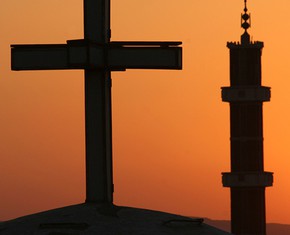The views expressed in our content reflect individual perspectives and do not represent the authoritative views of the Baha'i Faith.
We’ve come a long way in this ongoing “Figuring out Prophecy” series.
We began by looking at prophecies foretelling Baha’u’llah, and then moving to prophecies foretold by Baha’u’llah — where we learned the novel idea that Baha’u’llah’s principles also operate as prophecies, by virtue of their socially transformative power in not only predicting but in recasting the future.
When a new messenger of God arrives, the Baha’i teachings affirm, the principles revealed in that fresh outpouring of divine revelation become the driving forces for social and spiritual change.
So now let’s shift our focus from “principles as prophecies” to “prophecies as principals” — that is, prophecies as they relate to particular persons. In other words, we will transition from general prophecies to specific ones foretold by Baha’u’llah as they apply to some of the world’s political and religious leaders.
RELATED: How Prophets Make Prophecies – and What They Mean
In this passage, Baha’u’llah connects Christ’s prophecies and promises to Baha’i prophecies:
Briefly, in the sayings of Him Who is the Spirit (Jesus) unnumbered significances lie concealed. Unto many things did He refer, but as He found none possessed of a hearing ear or a seeing eye He chose to conceal most of these things. Even as He saith: “But ye cannot bear them now.” That Dawning-Place of Revelation saith that on that Day He Who is the Promised One [Baha’u’llah] will reveal the things which are to come. Accordingly … most of the things which have come to pass on this earth have been announced and prophesied by the Most Sublime Pen.
Let’s begin with this true story, which recounts how the greatest Baha’i scholar of the early years of the Faith became a Baha’i. One Friday, in early 1876, a well-known Islamic scholar, Mirza Abu’l-Fadl, took a donkey to a humble blacksmith’s shop on the outskirts of Tehran to shoe the donkey’s unprotected hoof. This remarkable conversation about the symbolism in holy scriptures and traditions, recounted in Gloria Faizi’s book Fire on the Mountaintop, took place with the farrier:
“Is it true, O learned divine,” asked the blacksmith of Abu’l-Fadl as he worked on the donkey’s shoe, “that it is recorded in our traditions that every raindrop is brought down to earth by an angel from the sky?” “Yes,” replied Abu’l-Fadl, “it is true.”
The blacksmith went on with his work. He picked up a nail and hammered it into place. Then he said: “I have heard that, according to our traditions, no angel ever enters a house where there is a dog. Is there indeed such a tradition?” “There is,” replied Abu’l-Fadl.
The blacksmith hammered in the last nail and said: “I presume that no raindrops ever fall in a place where there is a dog.”
Abu’l-Fadl felt hot with shame and embarrassment as he realized that an illiterate man had had to point out to him the obvious conclusion to be derived from the two well-known traditions. As he left the shop and joined his learned companions, one of them said: “The man you were talking to is a Babi [Baha’i].” That same evening Abu’l-Fadl began investigating the new Faith.
The blacksmith, who was illiterate, was Ustad Husayn-i-Na’l-Band, whose photograph may be found here.
Long story short, Mirza Abu’l-Fadl continued investigating the Baha’i religion, first by conversing with less educated Baha’i teachers — especially a cloth-seller named Aqa Abdu’l-Karim — and then with more highly educated Baha’i teachers, one of whom was Haji Muhammad Isma‘il-i-Kashani, titled Dhabih (Sacrifice) by Baha’u’llah.
One evening, this is what happened, according to Mirza Abu’l-Fadl himself, as recounted in his unpublished biography and translated by Adib Taherzadeh in The Revelation of Baha’u’llah, Volume III:
When we arrived we learnt that the Haji (Muhammad Isma’il-i-Kashani, Dhabih) was not at home, but his wife, who knew Abdu’l-Karim … warmly welcomed us and insisted with such love and hospitality that we went inside. … We entered a room in which there were books and a case containing Holy Tablets. … She gave us permission to open the case if we wished and study the Holy Writings. As Abdu’l-Karim was unable to read, he asked me if I [Mirza Abu’l-Fadl] would read for him. … I complied. There was a Tablet written on blue paper addressed to Sultan Abdu’l-Aziz. As I read it …I was fascinated by it. I found the passages to be of the utmost eloquence, lucidity — and sweetness. The more I read it, the more I wanted to read. I had never in all my life come across such wonderful utterances, which captivated my mind and attracted my heart. But I was thinking of everything in my mind except that these were the words of God!
Then I came to these exalted words: “Soon will We dismiss the one who was like unto him, and will lay hand on their Chief [Sultan Abdu’l-Aziz] who ruleth the land, and I, verily, am the Almighty, the All-Compelling.” [From Baha’u’llah’s Lawh-i-Fu’ad.]
Upon reading this statement I was awe-struck, and plunged into a state of astonishment and wonder. For about half an hour I became speechless. Immersed in my thoughts, I wondered whether it was great magic or sorcery, and certainly it provided a grave test for me.
Here is a fuller version of Baha’u’llah’s momentous prophecy:
Soon will We dismiss the one who was like unto him [Ali Pasha], and will lay hold on their Chief who ruleth the land [Sultan Abdu’l-Aziz], and I, verily, am the Almighty, the All-Compelling. Be thou steadfast in the Cause of God and extol thy Lord morn and eve. Suffer not the light of thy soul to be quenched by the calumnies of the one who was so blinded by Our bestowals as to turn away from God, the Lord of all names. He inspireth his devoted followers even as the Evil One prompteth his own. Erelong shalt thou behold him in evident loss both in this world and in the world to come. He, indeed, is among those whom an afflictive torment doth await. He despatched an epistle to someone in that land, a writ of the workers of iniquity, in which he mocked God and recorded that which filled all created things with dismay. Say: Canst thou find anyone to protect thee when the wrath of God, the All-Powerful, the Unconstrained, is visited upon thee?
Thus have We informed thee of that which lieth concealed within the hearts of men. Verily, thy Lord is the Almighty, the All-Knowing.
RELATED: How Baha’is Decode End-Time Prophecies
These prophecies about the rulers of the Ottoman Empire all came true within a few years after Baha’u’llah revealed them. This convinced Mirza Abu’l-Fadl that Baha’u’llah was indeed sent by God, according to Adib Taherzadeh:
One day in 1876 he met Haji Muhammad Isma‘il-i-Kashani, surnamed Anis. Mirza Abu’l-Fadl was handed the original copy of this Surih in the very handwriting of Mirza Aqa Jan, Baha’u’llah’s amanuensis; the Tablet wherein Baha’u’llah foretells that Adrianople will pass out of the Sultan’s hand and that confusion will overtake his kingdom. He was also given the Tablet of Fu’ad, in which the downfall of the Sultan is clearly prophesied. Upon seeing these two Tablets Mirza Abu’l-Fadl made his acceptance of the Faith conditional upon the fulfilment of these prophecies.
His Baha’i friends pursued him no longer. A few months passed and the news of the assassination of Sultan Abdu’l-Aziz reached Tihran. On hearing the news Abu’l-Fadl became very agitated. His soul was yearning for confirmation of the truth of this Cause, and yet his heart was not touched by the light of faith. He sat the whole night, read some Tablets of Baha’u’llah, and prayed with absolute sincerity until his eyes were opened and he knew the truth of the Cause of God. At the hour of dawn he went to the house of that faithful friend Abdu’l-Karim, and when the door was opened he kissed the threshold of that house and prostrated himself at the feet of the man who, through perseverance and love, had given him the gift of the Faith and led him to the truth.
















Comments
Sign in or create an account
Continue with Googleor